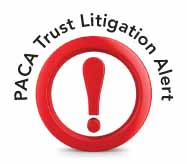 My phone rings the other day and I look at the number… I did not recognize it. Of course, I answer the phone with a friendly, “Good morning, this is Jason.” Just that quickly I am connected to a conference room filled with concerned produce company executives with little time for pleasantries. I quickly discover that the company is involved in a foodborne illness outbreak and has several concurrent fires to put out. Against this back drop, the questions start flying:
My phone rings the other day and I look at the number… I did not recognize it. Of course, I answer the phone with a friendly, “Good morning, this is Jason.” Just that quickly I am connected to a conference room filled with concerned produce company executives with little time for pleasantries. I quickly discover that the company is involved in a foodborne illness outbreak and has several concurrent fires to put out. Against this back drop, the questions start flying:
- Do I have to give the government copies of my customer list?
- Do I have to allow the government to take pictures of my product, operation, etc.?
- Do I have any rights when it comes to a government inspection?
- What do I need to say or not say to my customers?
- Is there something we should be doing that we are not?
- Does my insurance policy cover this?
- Do I have enough insurance?
- Does it matter that the contaminated product was not ours?
- Do we have any exposure here?
- What should we be doing right now to mitigate our exposure to any type of litigation?
- What should we be doing to protect our brand identify and the company name?
Grappling with any one of these questions while you are watching a foodborne illness outbreak unfold in real-time is both difficult and time sensitive. In an ideal world, you would have a crisis management plan ready to be pulled off the shelf and executed upon. Moreover, the company’s employees would be similarly prepared as they would have received re-occurring training on the company’s crisis management policies and procedures.
The reality for most produce companies is much different… Under a sales driven business model, it is far to common for produce companies to rely on the food safety promises of third parties (many of which are not readily capable of verification) and for product testing to be too heavily focused on good arrival standards, which are governed by the relevant sales contracts. Against this back drop, even successful produce companies find themselves in uncharted waters when they are thrust into the middle of a foodborne illness outbreak and forced to handle all the related media exposure, demands from government investigators and other unanticipated events.
So What Should You Do? (Top 10)
- Seek the advice of an experienced food law attorney of your chosing!
- Through either your attorney or your company, have strategic partners identified and available for you to call upon for assistance. This will help ensure that the crisis management activities of your company does not preclude the company from continuing its “normal” business operations.
- Don’t write anything or say anything that you do not want to see in the media.
- Know your rights and proactively manage any and all government inspections or requests for information.
- Prepare and implement a public relations plan designed to address at least two main target audiences: (i) your customers and (ii) the public.
- Initiate the audits necessary to both identify the source of the problem (contaminated product) and to trace all of the contaminated product that flowed through your company or which may still be in your company.
- Be aware of cross contamination issues…
- Know how to properly document all of the processes mentioned above.
- Know how to properly destroy contaminated food.
- Conduct a review of all relevant insurance policies, supply contracts and other documents that may contain contractual obligations the company must comply with during the crisis. (i.e. are you obligated to notify your insurance carrier of the problem within a certain period of time?)
As you can see from the foregoing list, there are many things a produce company needs to know and do in order to protect itself (as best it can) from the fall out associated with a foodborne illness outbreak. Many of these things can and should be prepared in anticipation of a foodborne illness incident that we all hope never occurs, but there are also many things that can be done and should be done as the event unfolds.
Again, if you find yourself in the middle of a foodborne illness outbreak or related recall you would be well advised to seek the advice of an experienced food law attorney of your choosing. As we know from witnessing the Jensen Farms outbreak, few companies are adequately prepared to deal with these types of situations and that could lead to the demise of your company. Of course, time is always of the essence in these types of cases.
Wrongful death cases related to foodborne illnesses cost the food industry billions of dollars each year and very few, if any, companies responsible for the problem live to tell the story. Why? Frankly this is the way juries like it when it comes to food safety and public health. Accordingly, these types of cases are often won or lost before a civil action is ever filed.









